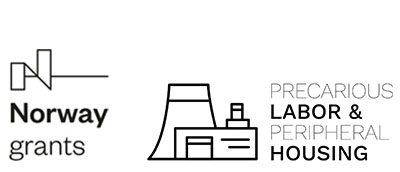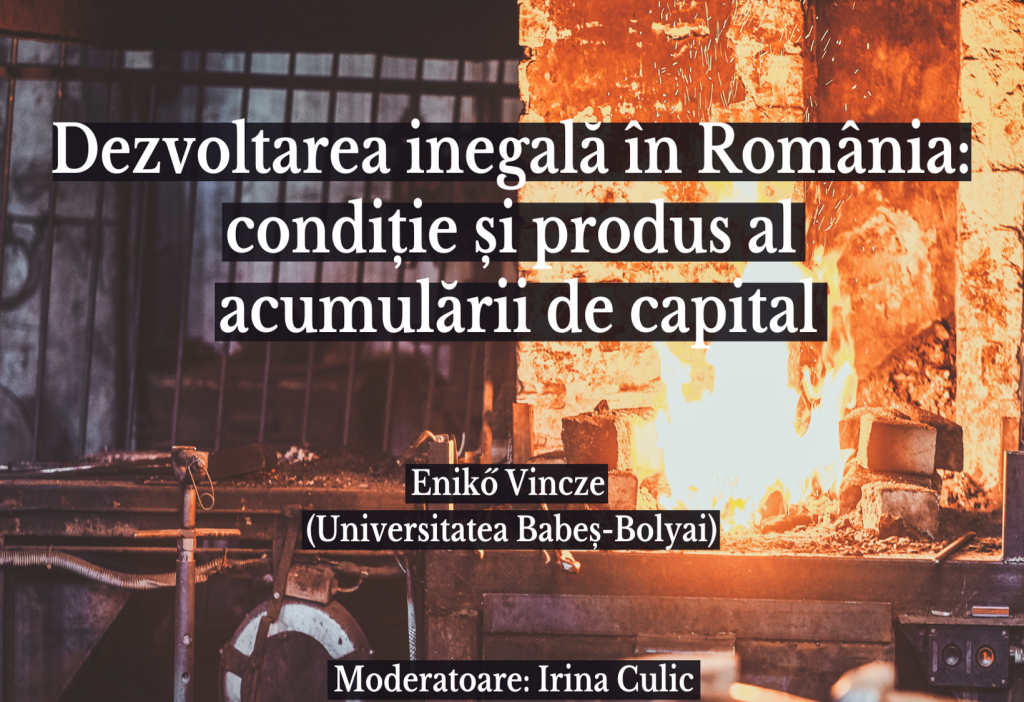In the next three years we will organise several conferences and workshops in which we will diseminate the results of this research project. These events are public and open to everyone. All call for papers and presentations will be posted here.
Our target was to reach 22 conferences by the end of the project (October 2023). We started the dissemination early and we have manged so far to deliver 21 conferences. We have budgeted some conferences next year as well. In addition to this we will organize next year a Final Conference where we will present the results of the entire project. We think that by the end of next year we will be able to surpass by a lot the initial target.
Attending conferences 2022
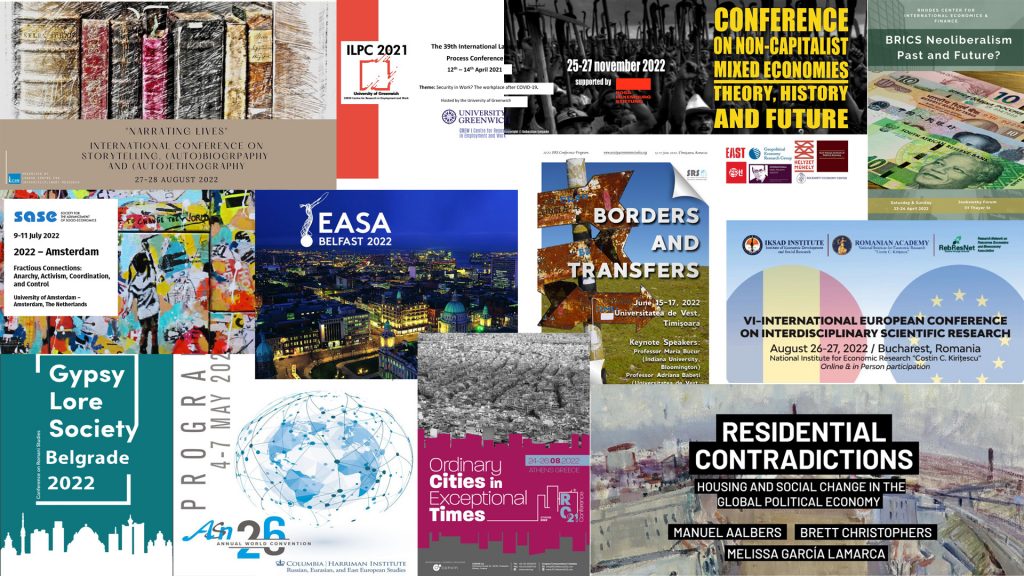
1. Deneva-Faje, Neda – Essential Workers or Dangerous Bodies: Eastern European Labor Migrants during the COVID-19 Pandemic, Conference: The 39th International Labour Process Conference. Theme: Security in Work? The Workplace after Covid-19, University of Greenwich, London, UK, 12- 14, April 2021
2. Vincze, Eniko & Gog, Sorin – A surplus population? The making of a racialized (non) working class in a former Romanian mining district, Conference: Rethinking Surplus Populations: Theory from the Peripheries, University of Bergen, Oslo, Norway and online, 13-14 December, 2021
3. Ban, Cornel – Business Factions, Populists, and the Social Bloc Perspective in Romania and Hungary: The Case of FDI-led Growth Regimes, Conference: Brown University’s Rhodes Center for International Economics and Finance Conference, “BRICS Neoliberalism: Past and Future?” 23-24 April, 2022
4. Marginean, Mara – Pollution, peripheral housing, and social marginalization: A sketch of the socio- economic practices of Romanian Roma in the 1970s, Conference: ASN Annual World Convention, On-line (Columbia University, New York. USA, 4-7 May, 2022
5. Ban, Cornel, Petrovici, Norbert, Mare, Codruta – Unpacking Dependent Export-Led Growth Regimes from a Subnational Political Economy Perspective, Conference: Society for the Advancement of Socio Economics; 2022 – Fractious Connections: Anarchy, Activism, Coordination, and Control, Netherlands, Amsterdam 9-11 June, 2022
6. Pernes, Raluca – Precarious industrial labour at the edge of the European Union: The case of Baia Mare, Conference: Borders and Transfers, Universitatea de Vest Timișoara, Romania, 15-17 June, 2022
7. Mireanu, Manuel – Building the City Through Security. The State and the Roma People during Communism in Baia Mare, Romania, Conference: European Association of Social Anthropologists – 17th EASA Biennial Conference: Transformation, Hope and the Commons, Belfast, UK, 26-29 July, 2022
8. Pernes, Raluca – Industrial work and inequality at the edge of the European Union: The case of Baia Mare, Romania, conference: EASA 2022: Transformation, Hope and the Commons, Belfast, UK, 26-30 July, 2022
9. Marginean, Mara – Peripheral housing, social marginalization, and uneven territorial development: The socio-economic practices of Romanian Roma in the context of changing industrial relations, Oral intervention during the roundtable: Peripheral housing, social marginalization, and uneven territorial development: The socio-economic practices of Romanian Roma in the context of changing industrial relations, Conference: Society for Romanian Studies 2022 Conference: Borders and Transfers, Bucharest, Romania, 15-17 June, 2022
10. Burlacu, Alexandru – Peripheral housing, social marginalization, and uneven territorial development. The socio-economic practices of Romanian Roma in the context of changing industrial relations. Oral intervention during the roundtable: Peripheral housing, social marginalization, and uneven territorial development: The socio-economic practices of Romanian Roma in the context of changing industrial relations, Conference: Society for Romanian Studies 2022 Conference: Borders and Transfers, Bucharest, Romania, 15-17 June, 2022
11. Marginean, Mara – Copper, Mining and Fragmented Social Policies: Industrial Work of the Roma in the 1970s Romania, Conference: 2022 Annual Meeting of the Gypsy Lore Society and Conference on Romani Studies, Serbian Academy of Sciences, Belgrad, Serbia, 28-30 September, 2022
12. Deneva-Faje, Neda – Romanian Roma between industrial labour and seasonal migration, conference: EASA 2022: Transformation, Hope and the Commons, Belfast, UK, 26-30 July, 2022
13. Solonean, Dana – The Land of Fire and Ice. A Migration Story, Conference: “Narrating Lives” International Conference on Storytelling, (Auto)Biography and (Auto)Ethnography, London, UK, 27- 28, August, 2022
14. Vincze, Enikő – Deindustrialization as a constitutive factor of real estate development in an East- European periphery, Conference: Ordinary Cities in Extraordinary Times, RC21 Conference, Athens, Greece, 24-26 August, 2022
15. Troc, Gabriel – Transnational Migration of Marginalized Roma Population. The Case of Baia Mare, Romania Conference: VI-International European Conference on Interdisciplinary Scientific Research, Bucharest, Romania, 26-27 August, 2022
16. Gog, Sorin – At the Margins of Industrial Cities: A Comparison Between Socialist And Post-Socialist Integration of Low-Skilled Workers In Romania, Conference: VI-International European Conference on Interdisciplinary Scientific Research, Bucharest, Romania, 26-27 August, 2022
17. Zamfir, George – Evicting The Roma: A Comparison Between Socialist and Postsocialist Practices In Baia Mare, Conference: VI-International European Conference on Interdisciplinary Scientific Research, Bucharest, Romania, National Institute for Economic Research ”Costin C. Kirițescu” 26-27 August, 2022
18. Vincze, Enikő – Residential unevenness in the context of changing housing regimes in Romania, Conference: Residential Contradictions. Housing and social change in the global political economy, Durham, UK, 28-29, August, 2022
19. Gog, Sorin – The Eastward Expansion of EU and the Impact of the Single European Market on mining and furniture industries in Romania, Conference: Interregnum Europe: Crisis, War and Alternative Futures International Conference on Alternative Models for European Integration, Bucharest, Romania, 22-24 September, 2022
20. Földes, Ionuț – Precarious employment and precarious standing in the global industrial supply chain. A look at Baia Mare’s scenario of reindustrialization, Conference: Interregnum Europe: Crisis, War and Alternative Futures International Conference on Alternative Models for European Integration, Bucharest, Romania, 22-24 September, 2022
21. Vincze, Enikő – The mixed housing order in Romanian state socialism, Conference: Non-Capitalist Mixed Economies (Theory, History and Future), 25-27 November 2022, Budapest
Conferences organized by Precwork in 2023
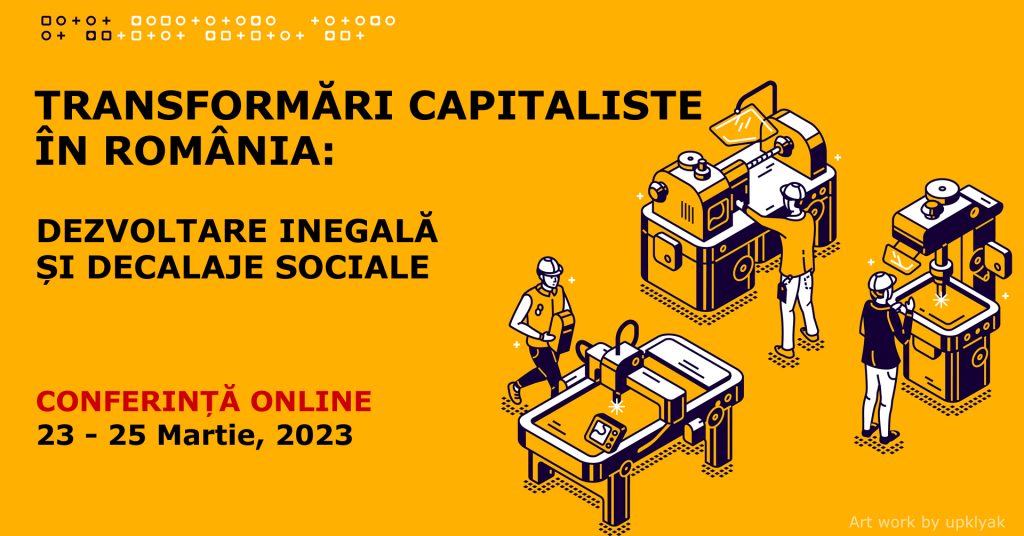
The last three decades of capitalist transformations have substantially changed the economy and social structures of the Romanian society and have led to the emergence of new types of industrial relations, different forms of work organization, new housing regimes, social practices focused on enhancing competitiveness and personal success and forms of cultural consumption adapted to the market economy. Within the social sciences in Romania, a relatively limited attention was paid to the critical analysis of capitalist transformations and the consequences that the transition to a new type of political economy and a new way of societal organization had on the Romanian population.
The purpose of this conference is to question from a critical perspective the capitalist transformations that have affected Romanian society over the last three decades and to analyze Romania’s specific political and economic trajectory in the context of the varieties of capitalism implemented in Central and Eastern Europe.
The event is organized under the collaborative framework of two research grants: ‘Precarious work and peripheral housing’, contract nr. 22 from 01/11/2020 (RO-NO-2019-0496) and ‘Social class formation and real estate reurbanization in an eastern periphery of global capitalism’ (PCE 65 from 08/02/2021). The institutional co-organizers of the conference are: Faculty of Sociology and Social work and Faculty of European Studies of Babeș-Bolyai University.
More about this conference at this link:
Uneven development in Romania: Condition and product of capital accumulation
Lecture presented by Enikő Vincze (Faculty of European Studies, Babeş-Bolyai University), during the conference capitalist transformations in Romania: Unequal development and social disparities
Moderator: Irina Culic (Department of Sociology, Babeş-Bolyai University)
Abstract: The presentation is based on the theories of unequal development and multiscale peripheralization, but also on my empirical research conducted in Romania over the last 10 years on the role of housing in the political economy, real estate development as the source of capital accumulation, and territorial development.
I will talk about unequal development as a condition of capital accumulation from the perspective of the transformations that Romania has undergone in recent decades, and that have assigned it a role in the territorial expansion of capital as a solution to the crises created by capitalism. Economic restructuring through privatization and de-industrialization; restoring economic dependence on foreign capital flows; precarisation and pauperization of labor force; exploitation of natural resources for export; privatization of banks and creation of a financial system for profit, supporter of the economy dependent on credit/indebtedness; opening locations in Romania for outsourcing services of multinational companies, especially in the field of information technology, are among the transformations I will refer to.
Then I discuss unequal development as a product of capital accumulation, how capital is directed toward territories and economic sectors promising safe, high and fast profits (e.g. housing and real estate development) in the semi-peripheral countries of global financialized capitalism, and how, thus, economic growth accumulates in some territories while others suffer from divestiture. This has become inevitable in Romania too, also because state policy has changed the role of the state in the economy, giving up economic and territorial planning in the context of generalized anti-communism.
My conviction is that a critical analysis of capitalist transformations in Romania must be channeled into a critique of capitalism, because Romania is not a country of failed capitalism, it rather illustrates the failure of capitalism. I maintain that our analyzes must substantiate a vision of the socialist alternative to capitalism, trying to answer the question, whether and how can the new contradictions of post-neoliberal capitalism of militarized state be put at the service of the realization of democratic socialism.
Papers inspired by Precwork
PANEL I: Precarious work and trans-national migration
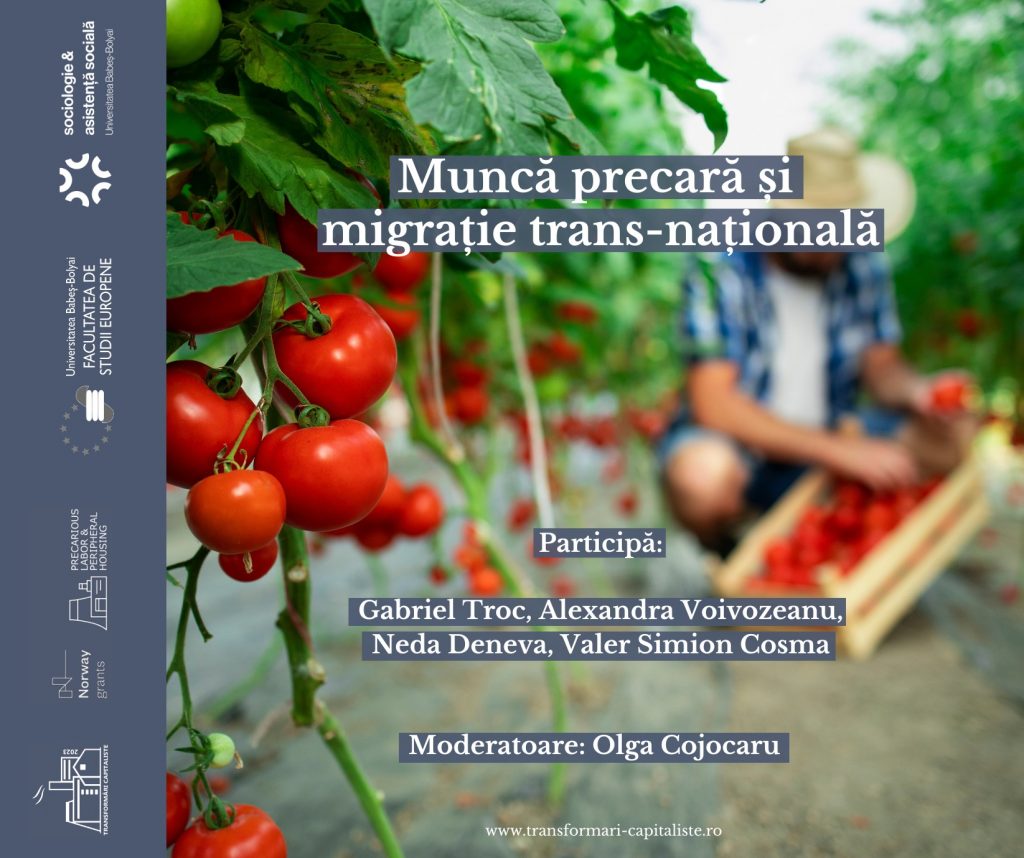
I1. Private wealth and public poverty: The limits of the contribution of transnational migration for local development in Maramureş county
Gabriel Troc (Faculty of Sociology and Social work, Babeş-Bolyai University)
Abstract: The presentation brings a long-term perspective on the topic of migration for work in Maramureş. In contrast to other Romanian populations, Maramureș county have always been constrained by historical and geographical circumstances to increased mobility. This has fueled a strong migration for work, within the country’s borders since 1960’, to Western European states after 1989. In both cases migration has resulted in substantial gains for the inhabitants of the area, who have constantly invested in improving their private material life.
This surplus, as well as the increased productive potential of the local workforce, did not materialize – as we will show – in public wealth, local development policies counting on losing bets each time: a socialist industrialization of Baia Mare incapable of using the demographic potential of the county, a development of underdevelopment by imagining historical Maramureș as an archaic paradise, or, more recently, a reindustrialization of the area that relies on an outdated neoliberal development strategy, focused on the involvement of a low-paid workforce, less qualified and “flexible” in her attitudes toward work and expectations of the benefits of work.
I3. Structural conditions of migration: precarious work in factories in the new wave of re-industrialization in Baia Mare
Neda Deneva (Babeş-Bolyai University)
Abstract: I will explore the formation of a flexible industrial workforce in a reindustrialized area of Romania and the effects of supply-chain capitalism on vulnerable local communities, their mobility and their social reproduction. I will look at the structural working conditions, citizenship and migration regimes in Europe that place workers in precarious positions both as migrants and as citizens. Starting from the Roma people case, I will show how industrial work in Eastern European factories operating in supply-chain logic supposes precarious working and living conditions, despite the fact that the sector claims to offer a stable, regular-time job.
The Roma in Baia Mare work in the industry on employment contracts and have access to social services. However, this does not in practice lead to stability, access to social services or financial security. Instead, workers often have to resort to seasonal transnational migration to supplement their insufficient incomes and balance difficult factory working conditions. Contrary to other examples of short-term emigrants combining informal work in different places by migrating, in this case we see how being employed with standard, full-time employment simply does not mean you have a sufficient salary to earn a living. In this case, therefore, migration is a revenue-adding strategy, which highlights the fact that outsourcing strategies provide unsustainable working conditions. Economic activities reflect the complex supply-chain capitalism processes that Roma navigate both as migrant workers and as citizen workers, the role that is mutually constitutive.
